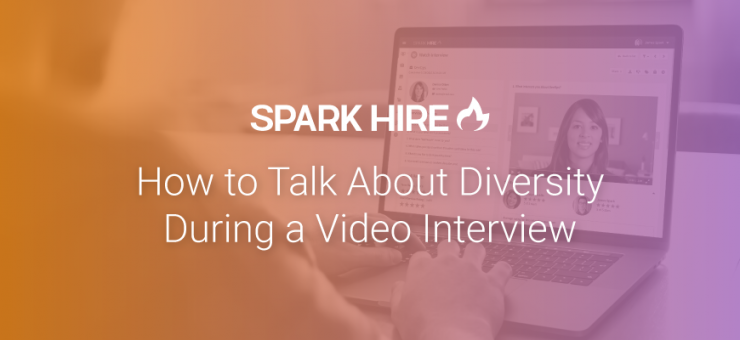“Do you have any questions for me?” This crucial moment of an interview is tough to navigate for many job seekers.
Often, the list of questions a candidate wrote down in advance were answered during the interview discussion. Things like day-to-day responsibilities, overall expectations, and company culture have been covered. But candidates will also want to ensure that their core values and beliefs align with the company’s values and beliefs, so they may take this time to ask questions about diversity and inclusion within the office.
In fact, how a company addresses questions around diversity may have a bigger impact than even salary or benefits on a candidate’s opinion of the position. It’s important to make clear how diversity is valued and encouraged at your workplace, with specific examples of how these values are demonstrated daily.
We asked hiring experts to share their insights based on real-life experiences with candidates to ensure job seekers have a clear understanding of a company’s focus on diversity in the workplace:
“What is your company’s perception about diversity?”
 The question was well-thought-out because most executives and recruiters know their company’s strategies to diversify their workforce. However, some of them don’t know the purpose of such strategies, which is a significant determinant if a company is pro-diversity or not.
The question was well-thought-out because most executives and recruiters know their company’s strategies to diversify their workforce. However, some of them don’t know the purpose of such strategies, which is a significant determinant if a company is pro-diversity or not.
My response was short and straightforward: A diverse workplace helps our company become more creative. A team composed of diverse and culturally-different people helps employees benefit from multiple unique perspectives. After compiling your co-workers’ inputs, you can create a more comprehensive and inclusive plan supported by many ideas.
Max Harland, CEO at Dentaly
 A straight-forward question about the company’s policy about diversity is a great starting point and it gives the interviewer the opportunity to expand on their interpretation of the company’s stance. Additionally, it shows the hiring manager that diversity is something the job seeker highly values.
A straight-forward question about the company’s policy about diversity is a great starting point and it gives the interviewer the opportunity to expand on their interpretation of the company’s stance. Additionally, it shows the hiring manager that diversity is something the job seeker highly values.
“How do you think about diversity in your workplace?”
 I thought it was a well-said question because it forced me to describe our philosophy about diversity. Is it a priority for us and what have we done about it? It made the candidate come across as thoughtful and communicated that diversity was important to them.
I thought it was a well-said question because it forced me to describe our philosophy about diversity. Is it a priority for us and what have we done about it? It made the candidate come across as thoughtful and communicated that diversity was important to them.
NealTaparia, Founder at Unscrambled Words
 In addition to getting insight about the company’s values, the candidate should also get an idea about the hiring manager’s personal thoughts. It gives job seekers the opportunity to see if their values align with the hiring manager’s. The interviewer should be specific when discussing the ways diversity shows up in their workplace, not simply reciting the diversity guidelines from the company website.
In addition to getting insight about the company’s values, the candidate should also get an idea about the hiring manager’s personal thoughts. It gives job seekers the opportunity to see if their values align with the hiring manager’s. The interviewer should be specific when discussing the ways diversity shows up in their workplace, not simply reciting the diversity guidelines from the company website.
“I came across the careers section on diversity and inclusion on your website. Could you elaborate on how you promote diversity on a team- and company-wide scale?”
 What’s great about this question is that the candidate didn’t just put the question out there, but they first demonstrated they’d done their homework and researched our company, and also low-key tied the question to a critical component of our workplace culture.
What’s great about this question is that the candidate didn’t just put the question out there, but they first demonstrated they’d done their homework and researched our company, and also low-key tied the question to a critical component of our workplace culture.
Jagoda Wieczorek, HR Manager at ResumeLab
 It’s always great for the job seeker to demonstrate they researched the company in advance of the virtual interview. Using research to lead into a question gives the hiring manager the opportunity to be more specific, which can help the candidate see how they practice what they preach.
It’s always great for the job seeker to demonstrate they researched the company in advance of the virtual interview. Using research to lead into a question gives the hiring manager the opportunity to be more specific, which can help the candidate see how they practice what they preach.
“Can you tell me about the structure of your team? I deeply care about working with a diverse group of people.”
 The way to appropriately tackle this topic if you’re interviewing is to just outright ask them. It’s 2020 and diversity is one of the most important elements of any company culture. You shouldn’t be ashamed of wanting to work in a diverse company, but they should be ashamed if they’re not actively working on being more diverse.
The way to appropriately tackle this topic if you’re interviewing is to just outright ask them. It’s 2020 and diversity is one of the most important elements of any company culture. You shouldn’t be ashamed of wanting to work in a diverse company, but they should be ashamed if they’re not actively working on being more diverse.
Tatyana Tyagun, HR Generalist at Chanty
 This is another great way to ask about a team’s diversity because the job seeker is outright explaining that it’s important to them. Following up a question by explaining why it matters to them reveals more about the candidate’s personality and values to the interviewer and provides the interviewer the opportunity to reflect on and discuss their own personal beliefs.
This is another great way to ask about a team’s diversity because the job seeker is outright explaining that it’s important to them. Following up a question by explaining why it matters to them reveals more about the candidate’s personality and values to the interviewer and provides the interviewer the opportunity to reflect on and discuss their own personal beliefs.
“What are you doing to make sure everyone feels included?”
 To answer the applicant’s question, I thoroughly discussed how I, as a leader, actively take part in assuring that everyone’s safe from discrimination, that everyone’s voices are heard, and that everyone’s presented equal opportunities.
To answer the applicant’s question, I thoroughly discussed how I, as a leader, actively take part in assuring that everyone’s safe from discrimination, that everyone’s voices are heard, and that everyone’s presented equal opportunities.
Ask questions about diversity in a well-thought manner. And, when you get answers, you should accept answers with an open mind.
Martin Seeley, CEO at MattressNextDay
 Inclusion is an equally-important component to a company’s diversity policy. This is a great question to help a job seeker identify how a company’s policies are put into practice by the hiring manager.
Inclusion is an equally-important component to a company’s diversity policy. This is a great question to help a job seeker identify how a company’s policies are put into practice by the hiring manager.
“How do you foster an environment where people who come from different backgrounds know you value their ideas?”
 I answered this question by informing the candidate that we have an open communication policy in the company. Our employees are free to express their ideas, which they think will benefit the company.
I answered this question by informing the candidate that we have an open communication policy in the company. Our employees are free to express their ideas, which they think will benefit the company.
I think the candidate asked this question because he wanted to make sure that he will be seen and heard when he joins our company. I believe that this is one common problem of employees, mostly new joiners, in the company they join.
Sonya Schwartz, Founder at Her Norm
 This question is another great way to ask a hiring manager to share tangible examples of ways they’ve ensured their employees feel included and valued. It’s open-ended, so the hiring manager is able to take it in any direction that makes sense to them.
This question is another great way to ask a hiring manager to share tangible examples of ways they’ve ensured their employees feel included and valued. It’s open-ended, so the hiring manager is able to take it in any direction that makes sense to them.
“How many women do you have in your company?”
 My response was straightforward. I let the candidate know the number of women in my company. My guess is that they already had a rough estimate of the total number of employees, so they were able to make a rough estimate of the ratio.
My response was straightforward. I let the candidate know the number of women in my company. My guess is that they already had a rough estimate of the total number of employees, so they were able to make a rough estimate of the ratio.
I found the question smart because they found out what they wanted by asking a seemingly unrelated question. There is no right way to address this because different employers will react differently to the question. My take is that a candidate should rely on their intuition and either go for an indirect or direct approach.
Reuben Yonatan, Founder and CEO of GetVoIP
 Sometimes, in a virtual interview, it’s easier to ask a more direct question to help the candidate get to the root of their concerns. If the interviewer isn’t comfortable with a direct question, it may show the candidate’s values don’t align with the interviewer’s after all.
Sometimes, in a virtual interview, it’s easier to ask a more direct question to help the candidate get to the root of their concerns. If the interviewer isn’t comfortable with a direct question, it may show the candidate’s values don’t align with the interviewer’s after all.
“Do you allow your employees to take days off during religious holidays? Is there a dress code or regulations in hair, accessories, or makeup? Do you allow your employees’ cultures to be displayed in outputs?”
 One of the reasons we opted to work remotely was to benefit from the culture, ideals, and knowledge of people from around the globe. This gives our company a wider point of view to reach more audience, so it is just fair that we celebrate with our employees their customs and traditions.
One of the reasons we opted to work remotely was to benefit from the culture, ideals, and knowledge of people from around the globe. This gives our company a wider point of view to reach more audience, so it is just fair that we celebrate with our employees their customs and traditions.
As long as it is in a respectful manner, I think that being interested in the company’s point of view on diversity shows that the candidate wants to be part of an involved and open team. They could share that they may use their expertise in a particular topic (like for example, in best hair products for afro hair), and that only gives me more reasons to hire them because they will contribute and help grow our community.
Alex Perkins, Co-founder at All the Stuff
 Each of these questions about diversity is a great way to dive deeper into a company’s stances. If there is a particular part of a job seeker’s culture they want to make sure is accepted at a company, then it’s important the interviewer remains specific and clear with their response.
Each of these questions about diversity is a great way to dive deeper into a company’s stances. If there is a particular part of a job seeker’s culture they want to make sure is accepted at a company, then it’s important the interviewer remains specific and clear with their response.
“Which values are put into action on a daily basis in your workplace?”
 This is a good question because how it is answered will speak volumes. Having to articulate precise actions that reflect their values will help you decide if they are walking the walk, or if they just respond with rhetoric from a mission statement.
This is a good question because how it is answered will speak volumes. Having to articulate precise actions that reflect their values will help you decide if they are walking the walk, or if they just respond with rhetoric from a mission statement.
The best leadership should care about the values that are important to their team, and diversity is an important factor when it comes to productivity, safety and inclusion.
Ian Kelly, VP of Operations at NuLeaf Naturals
 This is a great way to ask the hiring manager to illustrate the ways their diversity and inclusion priorities actually manifest on their teams. Interviewers can share a lot about a company’s culture by demonstrating these values in the day-in-the-life of an employee.
This is a great way to ask the hiring manager to illustrate the ways their diversity and inclusion priorities actually manifest on their teams. Interviewers can share a lot about a company’s culture by demonstrating these values in the day-in-the-life of an employee.
“How do you implement your company’s diversity values? What changes have you seen as a result?”
 Less diverse executive and hiring teams will be more sensitive and flustered by these types of questions if they don’t actively promote diversity, so you may get the answer you are looking for based on their reaction to the question itself.
Less diverse executive and hiring teams will be more sensitive and flustered by these types of questions if they don’t actively promote diversity, so you may get the answer you are looking for based on their reaction to the question itself.
But go in with the benefit of the doubt! If there has been genuine discourse and plans to promote diversity, they will be prepared to answer your questions about diversity without hesitation.
John Cho, Founder at My Pet Child
 Not only is it important to demonstrate the tangible ways a company’s values are executed, but it’s great to take it a step further and share the results. A hiring manager who knows that their company is better off because of their diversity and inclusion practices is more likely to maintain those practices. If the company is seeing positive results, they’ll continue to prioritize it.
Not only is it important to demonstrate the tangible ways a company’s values are executed, but it’s great to take it a step further and share the results. A hiring manager who knows that their company is better off because of their diversity and inclusion practices is more likely to maintain those practices. If the company is seeing positive results, they’ll continue to prioritize it.












